This is an authorized translation in English of a post in French by @terresco: Rencontres avec l'Afrique - La côte de l'or
As my primary language is not English, there are probably some mistakes in my translation.
Remember that the person who speaks here is NOT me, Vincent Celier (@vcelier), but @terresco, a French guy.

Ghana was formerly known as the Gold Coast because of the presence of many mines of the said metal. Object of all desires, first ethnic and then colonial. Yet gold is not its only wealth, the coast is wonderful, we discover nooks hiding wild beaches, mixture of white sand and wild rocks. The people are welcoming, its story is fascinating.
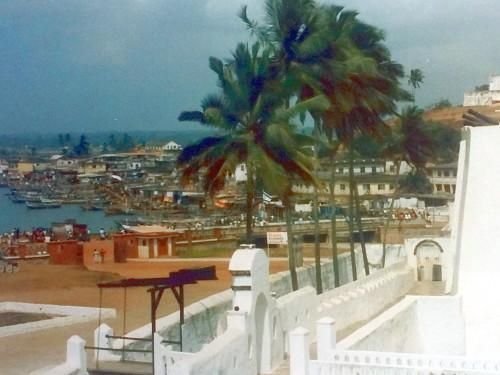
We went there regularly because the rocky coast was perfect for surfing. We did not hesitate to visit a different region during each trip.
A wild coast where you felt good
At that time, every day we were discovering forgotten waves, perfect, just for us. No one to forbid us anything or tell us between which buoys and at what time to surf. Nobody either to pick us up in case of difficulty, role devolved to friends, objects of reciprocal vigilance at all times. The resulting individual responsibility does not seem less effective than the generalized prohibition technique to avoid accidents. The satisfaction of being responsible for these acts, forced to think about their safety and that of our friends, is much greater and formative. Our European societies have an unimaginable delay in this area.
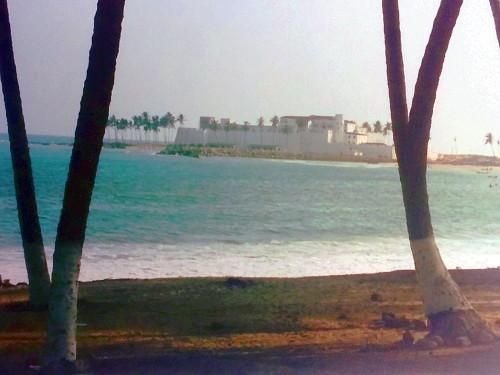
From time to time, in a village a little larger, there were hotels which had had a period of glory of which no living person could remember. There was no running water or electricity in these coastal villages. And not much food in the kitchen. The nights were pleasant, the stars dotted the sky with little competition from the small flames of kerosene lamps, unique sources of lighting.
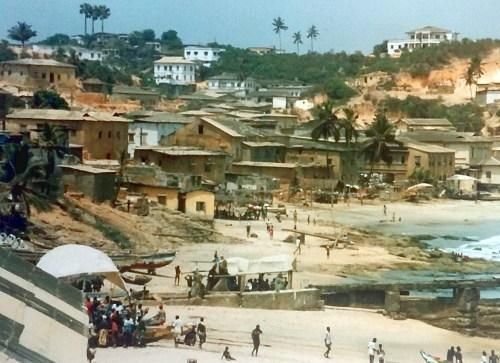
The tour of the village is quickly done and as a food we come back with half a packet of pasta, three Laughing Cow packages and some fruits. All is entrusted to the cook for a meal on the roof after the shower. The time has come and we wait patiently, checking the taps every 2 minutes. Suddenly someone shouts in the corridor: Running water! Running water! The tap remaining indifferent to the announcement, I open the door get more information. A young man galloped down the hall carrying a bucket of water ... running water indeed!. The meal was not less pleasant, the cook had done wonders, the setting and the company were exceptional.
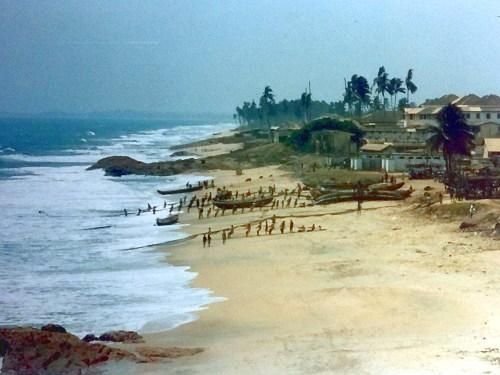
From the Gold Coast to Ghana
The colonial history of Ghana is rich in rebounding, first with the Portuguese navigators, discoverers of all this west coast of Africa, who arrived there towards 1470. The traditional story is that the tribes were decked out of jewels in gold . Big mistake! It did not take long for our first settlers to quickly discover the mining wealth, to take possession of the place and call it the Gold Coast region. Fearing competition from their fellow Europeans, they built the fortresses that served as a base for our surf trips. The names of Elmina, Cape Coast, places of so many tragedies, evoked for us holiday accommodation. Please forgive us, we were carefree young people.
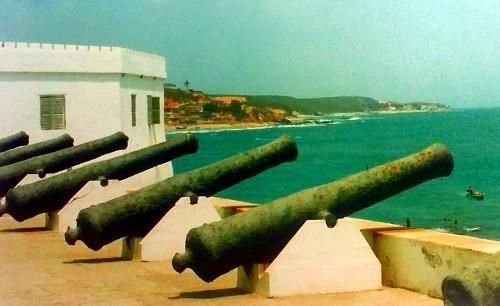
The most famous tribe is the Ashantis. Their king is the most respected person in the center of the country. The most sacred symbol for the Ashanti is the royal throne, guarded in Kumasi, their cultural capital. The throne symbolizes the spirit of the ancestors in local animistic beliefs. The chef wears a brightly colored kente, gold jewelery, gris gris. He goes out with many colorful umbrellas. The kente is a brightly colored fabric, made by the finest weavers and carefully chosen, which is used by Ghanaian chiefs.
It is imperative to make sure to attend one of these ceremonies where foreigners are welcome.
Today's Ghana, from what I have read, heard or seen in reports, has nothing to do with the Ghana in my memory. Fortunately for its population, Ghana has known since a development; the fortresses, I believe were developed as tourist destinations. But do not worry, I'm sure there are many nooks to discover.

-- @terresco
01: Encounters with Africa: Ivory Coast, by @terresco
02: Encounters with Africa: Abidjan, a daily pleasure, by @terresco
03: Encounters with Africa: The Tuaregs of Agadez, by @terresco
04: Encounters with Africa: The Tuaregs of Agadez, part 2, by @terresco
05: Encounters with Africa: On the way to the Dogon country, by @terresco
06: Encounters with Africa: Among the Dogon of Bandiagara, by @terresco
From Cape Town to Mombasa series:
01: Africa, the long crossing
02: From Cape Town to Mombasa: South Africa
03: From Cape Town to Mombasa: Namibia
04: From Cape Town to Mombasa: Botswana
05: From Cape Town to Mombasa: Zimbabwe
06: From Cape Town to Mombasa: Zimbabwe, part 2, by @terresco
07: From Cape Town to Mombasa: Zimbabwe, part 3, by @terresco
08: From Cape Town to Mombasa: Zambia, by @terresco
09: From Cape Town to Mombasa: Malawi, by @terresco
10: From Cape Town to Mombasa: Tanzania #1, by @terresco
11: From Cape Town to Mombasa: Tanzania #2, by @terresco
12: From Cape Town to Mombasa: Tanzania #3, by @terresco
13: From Cape Town to Mombasa: Tanzania #4, by @terresco
14: From Cape Town to Mombasa: Kenya, by @terresco
The gold coast is one location which is treasured by Africans and tourists alike.
This single location is trailed by a juxtaposition of sweet and bitter memories. The sweet memories is about the trading of gold by Americans and Portuguese alike while the bitter memories is central to it's association with the ills of slave trade. The ugly tales behind the later, makes every tourist rather emotional.
Thanks for interpreting this writeup, dear @vcelier
Your post is always different i follow your blog everytime,your post is so helpful.I always inspire of your post on my steem work.Thank you for sharing @vcelier
I most commend your efforts in interpreting this work for people like us to have the chance of reading this post @vcelier, you have done well.
I am an African and most, if not all African Countries have a great past and a story to tell. Their early beginnings, the challenges the faced, and where the currently are, are all stories to be told.
Honestly, I'm still amazed by this work and I would love to know what motivated you?
You will have to ask @terresco who wrote the original post in French.
Truly a beautiful post! Thank you for doing what you do! I look forward to the next one! Thanks for the share!
This is such an informative and amazing content. It's quite useful really. Thanks for sharing.
It is amazing to read articles like this one. I will definately research as much as I can about its original author.
You sir, have made a great translation for it is still a very compelling story.
Thanks!
See the photo, so want to visit directly there.
Nice poste :D
I've never considered Ghana as a holiday spot but after perusing this amazing post, it's definitely on my holiday destination list. Thank you for sharing in such a positive and enlighten manner.
This is such an informative and amazing content. It's quite useful really. Thanks for sharing.
A very meaningful journey and this becomes a benchmark in a megara that has a remarkable mining result but a very horrible poverty in Ghana indeed we see a lot of countries that have abundant crops but injustice still done .from this post you write provides an incredible view to everyone and a highly beneficial learning @vcelier
may the more mature leaders of the whole country to prosper the country and its inhabitants
Success always with you @vcelier
Bravo !!!
we win together